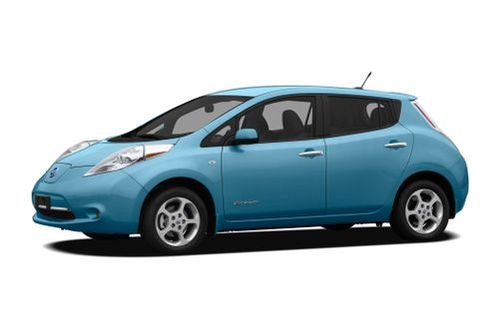Hey Dave, Great eevBLAB by the way!!! You hit the nail right on the head!
To add my 2 cents here it goes...
1) I drive a Honda CR-V, it's now going on 8 years (2011 model) and around 65,000 km.
2) I've started biking to work, which is about 5 km away, takes me 20 minutes.
I've looked at electric cars and really the use-case scenario depends on a complex formula involving your yearly driving mileage, types of activities and haulage you do, the cost differential of electric vs. gas vs. hybrid in your area, and the price of gas, weather, price of the car (affordability) and many other factors. To believe that ELECTRIC is going to overtake GAS for everybody is INSANE!!!!

Just like every other technology, I see electric as a nice option that will reach an equilibrium and perhaps suit the needs of a certain percentage of the population, but ultimately increasing adoption will be the result of changes in the various factors I mentioned above and re-evaluation by consumers at each step of their life to see if it makes sense or not. But I don't see an electric vehicle suiting my needs any time soon.
My car:

For one, my ridiculously low mileage annually and the fact that I am also trying to put in a decent number of bike days in my daily commute to work would *seemingly* make me want to buy a low-range electric? As paradoxical as that sounds, it is actually better for me to own the Honda. The stats show about 10 km/L fuel economy, which is basically a drive to work and back. The tank holds 40 L, so theoretically it should last me 40 days, but in actuality I need to fill up about every 2-3 weeks because of other trips. Let's say 2 weeks. Cost of gas these days is $1.15/L, so let's say $50 a tank, biweekly, or $1300 a year in fuel ($50 x 26). To cross-reference the math, let's say I use 40L biweekly, that's 1040 L per year. So at 10km/L I would be able to travel about 10,400 km annually. This is within reason as my car has under 70,000 km and it's a 2011 model I've had for 8 years so yes I actually do less than 10,000 km per year on it. And that's not even with biking, which I only started recently... Imagine how many fewer days I would use the car when I bike!!!!
The NISSAN LEAF in Canada starts at $42,298. My Honda CR-V with leather and alloy wheels (almost top model just 1 step below, missing built-in GPS Nav) cost me about $35,000. The base model starts at $27,690, and they have a hell of a good retention value because they last and have low maintenance.
Leaf:

Not that you can compare APPLES and ORANGES here. I wouldn't be able to throw nearly as much into the back of a Nissan Leaf as I can into my Honda CR-V where the entire back seats drop and the hatch-back can swallow up bikes, lumber, patio stones, etc... no problem. But even the price alone differential between the Leaf and base CR-V is $42,298 - $27,690 = $14,608 Loonies!!!! (That's Canadian bucks for you).

So based on the cost of gasoline for me, even at say $1400/year, I would have to drive over 10 years at the current rate JUST TO gain a return on investment on fuel savings, and that's not even including the cost of electricity for 10 years which I'd need to spend on the Nissan Leaf. So I have this...
Honda CR-V + 10 years worth of gas = Nissan Leaf + free electricity for 10 years

What would the cost be to charge a Nissan Leaf, to go 10,000 km a year? How many KwH and at what Canadian charging rate (let's say the cost of hydro at night during low-peak hours) would it cost me in electricity per hour? What are the maintenance costs going to be on a Leaf? Higher? Lower?
You see, IT MAKES NO FREAKING SENSE for me to buy even one of the CHEAPEST electric cars on the planet. I can take the CR-V on long road trips no problem, handle snow and get serviced almost anywhere no problem. It is a no-brainer. And I didn't even mention the FREEZING Canadian winters here where you will see that Leaf battery range dwindle severely, and try handling some snow in that little thing.
Even if I were to ever get a new car, I'd probably get a Hybrid with minimal range-electric to jump back and forth to work, but have the capacity to fuel long-distance drives. But even so, any plug-in hybrids are fairly pricey. One honda.ca you can find the Clarity plug-in Hybrid MSRP $40,100 but it says government incentives up to $13,000, so potentially you could get if for about $27,100 (although I highly doubt that, if anything maybe $5,000... either way it would probably be in the mid-$30k's). Anyways, this car has a 76km range which would suit my needs a full week before I have to plug it in. I could theoretically never use the gas in it. And total driving range is about 500km on a tank.
Incidentally, a Telsa Model 3 which is the cheapest Tesla base price Canada is $54,990.

That is almost 2 Honda CR-V's. Definitely off my radar.
I'm not sure whether its "eco-friendly" delusion/euphoria or "keep up with the Jones's" (not Dave, but you know the saying) happening but if one jumps in on an electric vehicle purchase without doing these calculations it could be a costly mistake. It's always good to think about electric/hybrid and be nice to our planet but you may be able to find other ways to do it, and get your "carbon credits" somewhere else in your lifestyle behaviour patterns. It really depends on your motivation and goals behind the purchase, and why you are choosing electric or not.